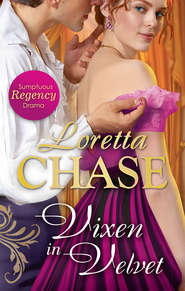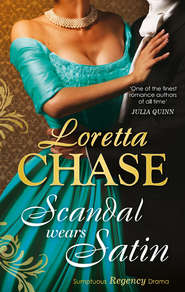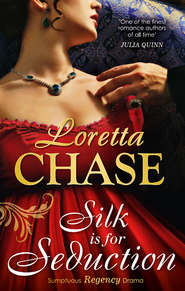По всем вопросам обращайтесь на: info@litportal.ru
(©) 2003-2025.
✖
Regency Rogues and Rakes: Silk is for Seduction / Scandal Wears Satin / Vixen in Velvet / Seven Nights in a Rogue's Bed / A Rake's Midnight Kiss / What a Duke Dares
Настройки чтения
Размер шрифта
Высота строк
Поля
“Don’t stand there like a lump,” Longmore said.
“You’re the one who wants to make a great secret of this.”
They followed her into the room. She closed both doors.
“This is a typical Fairfax family tempest in a teapot,” Longmore said. “Clara’s incapable of running away. She can’t dress herself. She barely knows how to feed herself. She has no money. Where could she go?”
“She took Davis,” Valentine said.
“You can’t be serious.”
“What sort of joke do you imagine I’m playing?”
“A lady can’t keep secrets from her personal maid,” Sophy said. “She’d have to tell Davis. Though Davis must have been extremely unhappy about it, she’d never tattle or let Lady Clara go alone.”
True enough. Davis was a bulldog of a maid, ferociously loyal and protective. As well, she had—or so Longmore had always assumed—both feet planted firmly on the ground.
“Clara drove out in her cabriolet near midday,” Valentine said. “She had a lot of parcels she said were old clothes she was taking to one of her charities. Then she was going to visit Great-Aunt Dora in Kensington and spend the night. She’s done that before. No one gave it a second thought. We might not have known the truth until tomorrow, if Great-Aunt Dora hadn’t come to see Mother today. Then we had a to-do, as you can imagine.”
Longmore was amazed he couldn’t hear the screaming from here. Warford House was only a few streets away, overlooking the Green Park.
“Did Lady Clara leave any message?” Sophy said.
Valentine got all stiff. He took off his hat and made an extremely correct bow. “I don’t believe I’ve had the honor,” he said.
Pompous ass.
Longmore said, “Miss Noirot, will you allow me to present my brother, Valentine Fairfax.”
Another excruciatingly polite bow from the nitwit, who said, “Miss Noirot, perhaps you’d be so good as to allow me to speak to my brother in private.”
She curtseyed. It wasn’t remotely correct. Down she went in a great flurry of bows and lace and muslin whispering like scandalized playgoers when a notorious tart appeared in her theater box. And up she came again, graceful as a ballet dancer. Then she looked up at Valentine, all wide blue eyes. “I’m not good at all,” she said. “Ask Lord Longmore.”
“I’m still undecided in that regard,” Longmore said. “I will say it’s no good trying to keep secrets from her.”
Valentine, now gazing raptly into the great blue eyes, didn’t hear a word.
“A message, Valentine,” Longmore prompted. “Did our sister leave a message?”
Valentine shook himself out of his trance and dug out from the recesses of his waistcoat a piece of notepaper. He gave it to his brother.
The message was short enough:
I will not marry that man. I’d rather be disgraced for the rest of my life and live as a beggar.
C.
“Oh, good,” Longmore said. “That’s what we need: drama.”
Yet he remembered the way Clara’s face had crumpled last week, when he’d brought her here. She’d said … What had she said?
Something about their mother harassing her. Something about the marriage. The hasty marriage.
The marriage she wouldn’t have had to face had he done the one simple task even he’d understood was necessary: keep Adderley away from her.
Sophy held out her hand. He gave her the note.
She scanned the few lines quickly. She turned the paper over. On the outside Clara had written “Mama.”
“As soon as Mother realized that Clara hadn’t gone to Aunt Dora’s, she ran upstairs and ransacked Clara’s room,” Valentine said. “The note was tucked into Clara’s jewel box. She’d taken everything else out of it. Not that she’d much of value there. Usually our mother lends her jewelry—and she keeps the good things under lock and key.”
“She could sell her clothes,” Sophy said. “Her maid could do it for her. That’s why she took all the parcels.”
Both men looked at her.
“They’d fetch a fair sum, each of her dresses, especially the ones we made,” she said.
That was when Longmore felt the first stirrings of alarm.
Clara. On the road. With nobody but her maid to look after her.
He felt sick.
“I daresay our mother’s worked that out by now,” Valentine said. “She’d have found the wardrobes and such empty.”
“Has she stopped screaming long enough to work anything out?” Longmore said.
“She didn’t scream at all,” Valentine said. “First she fainted, then she started crying, then she locked herself in Clara’s room. She won’t let anybody in and she won’t speak to anybody.”
“Oh, no. The poor woman.” Sophy put her hand to her mouth and closed her eyes. It was only for an instant. One hint of emotion. Longmore realized at that moment how rare a sight it was: true emotion. He didn’t know how he knew it was true, but he knew it in the same way he knew her, no matter what disguise she wore.
A glimpse of feeling, then it was gone, and she became brisk. “One could wish she’d left larger clues. But she did take her maid. And clothes and trinkets to pawn. So she planned, to a degree. But first things first. We need to discover which direction she’s taken.”
“We?” the brothers said simultaneously.
Lord Valentine Fairfax, whom Sophy had seen many times before, resembled his eldest brother only in size. His coloring was like Lady Clara’s. Yet it was obvious they were brothers. Both men regarded her with the same rapid succession of expressions: surprise, confusion, annoyance.
They were aristocratic men. Their brains were not over-large and definitely not attuned to subtlety.
She donned a look of confusion. “I assumed you’d wish to help me.”
“Help you?” said Lord Longmore.
Lord Valentine remembered his manners. “It’s very—er—kind of you, Miss—er—”
“Noirot, you idiot. I told you. Clevedon’s sister-in-law. And if she—”
“Yes, of course,” said Lord Valentine. “I daresay we can call on Clevedon to assist in organizing a search.”








